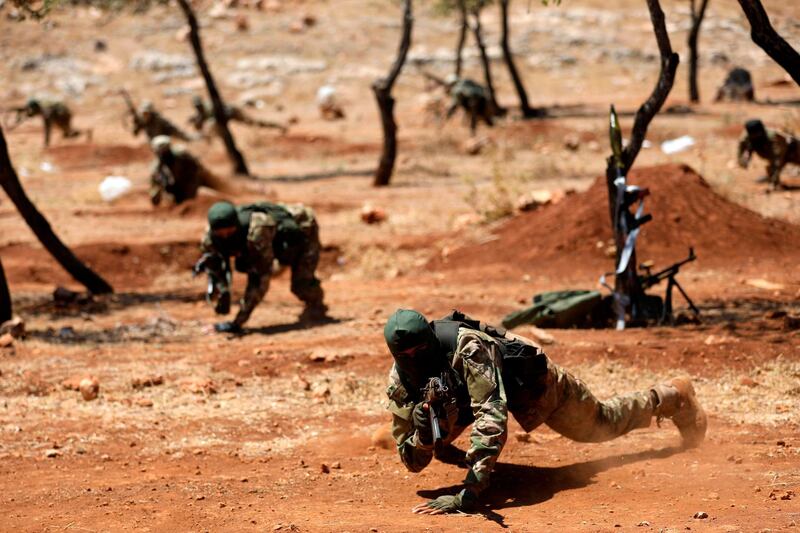The clever move for Syria's foreign minister would have been to declare the deal dead and move the regime's tanks into Idlib. But Walid Al Muallem, speaking on Monday just hours after a deadline for militants to leave a buffer zone came and went, didn't do that. Instead, he offered more time.
Monday was the deadline imposed in the deal brokered by Turkish President Recep Tayyip Erdogan and Russian President Vladimir Putin in Sochi last month to avoid an all-out assault on the province of Idlib. Under the terms of the deal, a demilitarised buffer zone was to be carved out of Idlib, with militants and heavy weapons banned from the demarcated strip.
But yesterday the main militant group in the province, Hayat Tahrir Al Sham, which had prevaricated for weeks, finally issued an ambiguous statement.
"We have not abandoned our choice of jihad and fighting towards implementing our blessed revolution," its members said in a brief statement that did not confirm they would leave, nor declare that they would fight on. Without any clarity on whether they are staying or going and having stalled indefinitely, Hayat Tahrir Al Sham is still playing for time.
It is not alone. Almost every faction in the looming battle in Idlib would prefer to wait a bit longer. Turkey, Russia, multiple militant and rebel groups and, of course, the three million civilians within reach of the regime's forces and barrel bombs, would prefer an extended period of peace. Faced with the alternative of war, most sides seem happy to let the deadline pass by.
Yet the problem is that the Sochi deal merely delayed an inevitable reckoning with militant groups inside Idlib, in particular Hayat Tahrir Al Sham. What to do about the group is the central problem of Idlib – not least for its own members, who have yet to decide their next move.
Hayat Tahrir Al Sham is the biggest and best-equipped militant group inside Idlib and by some estimates, controls two-thirds of the province's territory. Unlike the Free Syrian Army rebels, which has now re-organised under a different banner of the National Liberation Front, Hayat Tahrir Al Sham, a former Al Qaeda affiliate, does not have Turkish support. That means its options are limited.
With almost all other militant groups agreeing to remove heavy weaponry like tanks, artillery and armoured vehicles from the demilitarised zone, it is only Hayat Tahrir Al Sham's refusal to comply that could trigger a full-blown assault, an attack that could cost thousands of lives. It is little wonder that there have been protests in Idlib against the group.
With public support draining, Hayat Tahrir Al Sham cannot hope to style itself as a champion of the oppressed. Nor can its members hope to withstand an assault. The best course of action would be to give up their weapons and hope to fight another day.
But the leaders who will have to make the decision know that they will be targets, wherever they go. Leaving the buffer zone would mean moving further north, closer to the Turkish border, where the Turkish-backed rebels are more deeply embedded. Those rebels have already carried out arrests and killed Hayat Tahrir Al Sham members. Going north would certainly bring more danger.
Hayat Tahrir Al Sham's calculation comes down, in the end, to basic survival: with few geographical escape routes, and knowing that the regime, the Turks and the Russians are hunting them, its members might calculate it is better to face down an attack before they hand over the heaviest weapons in their arsenal.
For Turkey, it is essential that there is movement on the group. Ankara's whole Syrian strategy has revolved around staying put in some capacity in Idlib province. Turkish officials over the past month have played up the possibility of a deal with Hayat Tahrir Al Sham but nothing has materialised.
Yet even without a deal, Turkey still has strong options. Had other militant groups joined Hayat Tahrir Al Sham in refusing to accept the deal, Ankara would find itself in a difficult position. As it stands, it could always use the rebels from the National Liberation Front to attack Hayat Tahrir Al Sham, something that could even buy them some credibility with Moscow.
For Russia, having already agreed to let Turkey handle the Hayat Tahrir Al Sham problem, there is no benefit in pushing for a swift resolution. Moscow is gearing up to make Syria an essential part of its global footprint and expects to be there for years – indeed, decades, since the lease agreed last year for the naval base at Tartus will last for half a century. A few lost weeks are negligible.
The loser in all of this is the Syrian regime itself, which has bowed to its sponsor. By saying that he would “wait for the Russian reaction”, Mr Al Muallem effectively handed over both a decision and any power to Moscow and missed an opportunity to push to retake Idlib.
Hayat Tahrir Al Sham refusing to sign up to the agreement could have given an excuse to use force to reclaim the province, at the same time throwing into chaos Turkey's long-laid plans to retain a presence in Idlib. That the regime did not do so is more testament to how militarily reliant it has become on Russia, rather than giving any sense that it is beholden to the deal.
For now, all sides appear to be playing for time. But Hayat Tahrir Al Sham's ambiguity means that there is still a real risk of an all-out assault on the province. The few weeks' grace granted to the besieged population of Idlib could prove tragically temporary. All eyes are now on a militant group in a marginalised part of Syria; its next move could decide the fate of countless Syrians.





